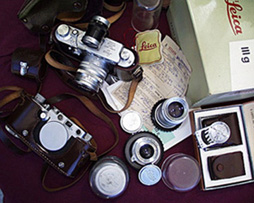Leica Question
Nov 10, 2018 08:44:58 #
Bipod wrote:
...The Marshall Plan trned out to be a very good investment in peace and security.
Very good investment? That is an understatement. It was the United States at its best. Many thanks to all who acknowledged that, especially on the day before the centennial of the end of World War I.
Nov 10, 2018 09:12:33 #
The only reparations issue I know about is that when the war ended Russia transported the Zeiss lens company in Jena, Germany back to Красного́рск. This is the start of KMZ and Zorki lenses, among others. I use a Leica IIIf with Zeiss lenses along with KMZ and Zorki lenses. All are excellent. Was Russia "supposed" to do that. Who knows? But, after what Germany did to Ukraine and Russia, I can't blame them.
--Bob
--Bob
Big Yankee Fan wrote:
I just thought of this while going through my late... (show quote)
Nov 10, 2018 09:59:02 #
I wondering if people are getting mix up with that after WWII German's companies lost all patents . Japanese camera companies began making very good copy of the Leica's cameras. I have a Niccas S-3, which is as good as my Leica IIIb. Both cameras have Leica's lenses on them.
Nov 10, 2018 10:06:36 #
A fascinating related story is about the “Kardon” camera. In short, when Leica cameras became unavailable to the US because of the war, a ex-pat named Sidney Kardon decided to make a worthy substitute in the US for use by the military (and, later civilians). The results were technically excellent, but a financial disaster for him. I have one of the cameras — similar to a Leica IIIf — and it is truly excellent. Some are occasionally available.
Here is a link to the story:
https://www.shutterbug.com/content/kardon-camera-american-tale.
Here is a link to the story:
https://www.shutterbug.com/content/kardon-camera-american-tale.
Nov 10, 2018 10:11:58 #
jerryc41 wrote:
I never heard about that war reparations story, but I guess anything is possible
On a related note, I was surprised to learn that at the start of WW II, the U. S. government was appealing to citizens to turn in their optical glass - lenses from cameras, binoculars, telescopes.
On a related note, I was surprised to learn that at the start of WW II, the U. S. government was appealing to citizens to turn in their optical glass - lenses from cameras, binoculars, telescopes.
Not surprising about the military needing donated optical equipment when the war started. The U.S. Army went from about 270,000 in 1940 to 1,462,000 in 1941 and over 3 million in 1942. The Navy’s growth was a little slower, but personnel went from 161,000
in 1940 to 640,600 in 1942 and 1.7 million in 1943.
Going the other way, I was told that there was a boom in amateur astronomy after the war when a lot of the Navy’s big 50 and 70mm binoculars were sold as surplus.
Nov 10, 2018 10:16:19 #
abc1234 wrote:
Just what do you mean by "at even the peril of our own"? Relying on history, give us an example of this. By the way, "The Mouse That Roared" was fiction, not fact.
Are you stupid or ignorant with that stupid comment?
Nov 10, 2018 10:52:20 #
Bipod wrote:
The US never asked Germany to pay war reparations.... (show quote)
Yes to this. The most generous act of a nation in the history of the world also turned out to be the most self beneficial. There’s a lesson there somewhere.
Andy
Nov 10, 2018 10:58:19 #
Nov 10, 2018 11:11:27 #
Quinn 4 wrote:
Thank you William Royer for the information on the "Kardon" camera.
The story did have a happy ending for Peter Kardon, though. He went on to found Harman Kardon, which became a very successful manufactor of high end audio equipment. I still have one of their receivers from the 1970s, and I believe they’re still around today.
Andy
Nov 10, 2018 11:14:07 #
Architect1776 wrote:
Are you stupid or ignorant with that stupid comment?
Wow, Architect1776! Off your meds again? Short fuse with poor communication skills might explain?
Nov 10, 2018 11:32:52 #
Architect1776 wrote:
Are you stupid or ignorant with that stupid comment?
I beg your pardon. Apparently, you cannot substantiate your statement.
Nov 10, 2018 12:15:50 #
amfoto1
Loc: San Jose, Calif. USA
Big Yankee Fan wrote:
I just thought of this while going through my late... (show quote)
No, I have never heard of "war reparation" Leica.
However, my Dad was a USAF officer and pilot. Our family spent several years in England in the late 1950s and Dad bought Leica gear there at very good prices, through the Post Exchange (PX).
Here's a photo of his gear (which he gave to me some years ago)...

IIIC and IIIG cameras, 5cm f/1.5 Summarit, 3.5cm f/3.5 Summaron, 9cm f/4 Elmar lenses and various accessories.
Those are Leica M39 "screwmount" cameras and lenses that were purchased around 1957 to 1959. The IIIG camera (last of the M39 models, in fact) and a Leitz Summarit 5cm f/1.5 lens cost him all of $150, according to the receipt that's still in the box. Perhaps part of the reason for the favorable prices was that Leica was transitioning from the screwmount to the M-series with bayonet mount lenses. But there also were discounts for the military.
Probably what you are hearing is post-war reconstruction (Marshall Plan), which was done by the US both in Germany and in Japan. Essentially, after the war the US deployed occupying military and other resources to help re-start the economies of the defeated countries... The idea being that this would help avert yet another major war. The camera industries were among a number that were strongly supported under these programs. It was common for cameras to be marked "Made in Occupied Japan". In fact, prior to WWII Japan's camera industry was thriving internally, but had little market share outside the country. Some of the brands we know well today were unknown outside Japan. During WWII, the Japanese camera industry was restricted to only produce gear for the war effort and a lot of consumer cameras were left sitting on shelves unassembled. Right after the war during the reconstruction, production was restarted and there was a concerted effort to export the gear, in part through special deals for the occupying military.
German camera manufacture already had a fairly global marketplace. More-so than Japan. Leitz, Schneider, Zeiss and many others were already well established and shipping photographic products worldwide prior to the war. It was a different situation there, due to the division of Germany and Berlin between the U.S. and the USSR. Even camera manufacture was divided.... some brands (Praktica, Exacta and others) were the Soviet side side of the "Iron Curtain", while Leica and others enjoyed a more global marketplace.
The post-WWII reconstruction lasted roughly 5 years after the end of the war.... to around 1950. But a lot of it's "footprint" and effects continued. It even intensified in a sense in Europe due, to Cold War divisions and a heavy military presence through the 1950s and beyond. This effected everything! Not just the camera industry. It was the dawn of the Space Age when Russia launched Sputnik, the first satellite. It was also when the US and USSR were scrambling to build as many nukes as possible, testing them on atolls in the Pacific, building fallout shelters at home and showing kids "duck and cover" films in school.
I suspect what you've heard about are the reconstruction efforts and the later military buildup in Europe, which established large bases that included the PX system selling discounted products (some of which were made specifically for that market).
Nov 10, 2018 17:49:43 #
abc1234 wrote:
I beg your pardon. Apparently, you
cannot substantiate your statement.
I beg your pardon. Apparently, you
cannot substantiate your statement.
Only trolls get all picayuney about
self evident generalities and simple
common knowledge.
`
Nov 10, 2018 18:01:37 #
User ID wrote:
Only trolls get all picayuney about
self evident generalities and simple
common knowledge.
`
self evident generalities and simple
common knowledge.
`
What".
Nov 10, 2018 18:24:59 #
Many may be surprised to know that World War 1 officially ended Oct. 3, 2010.
--Bob
--Bob
Big Yankee Fan wrote:
I just thought of this while going through my late... (show quote)
If you want to reply, then register here. Registration is free and your account is created instantly, so you can post right away.





